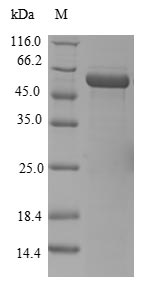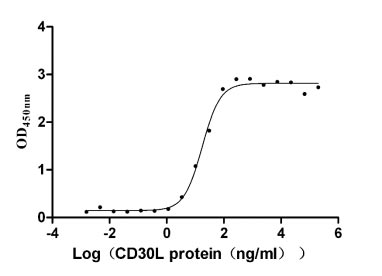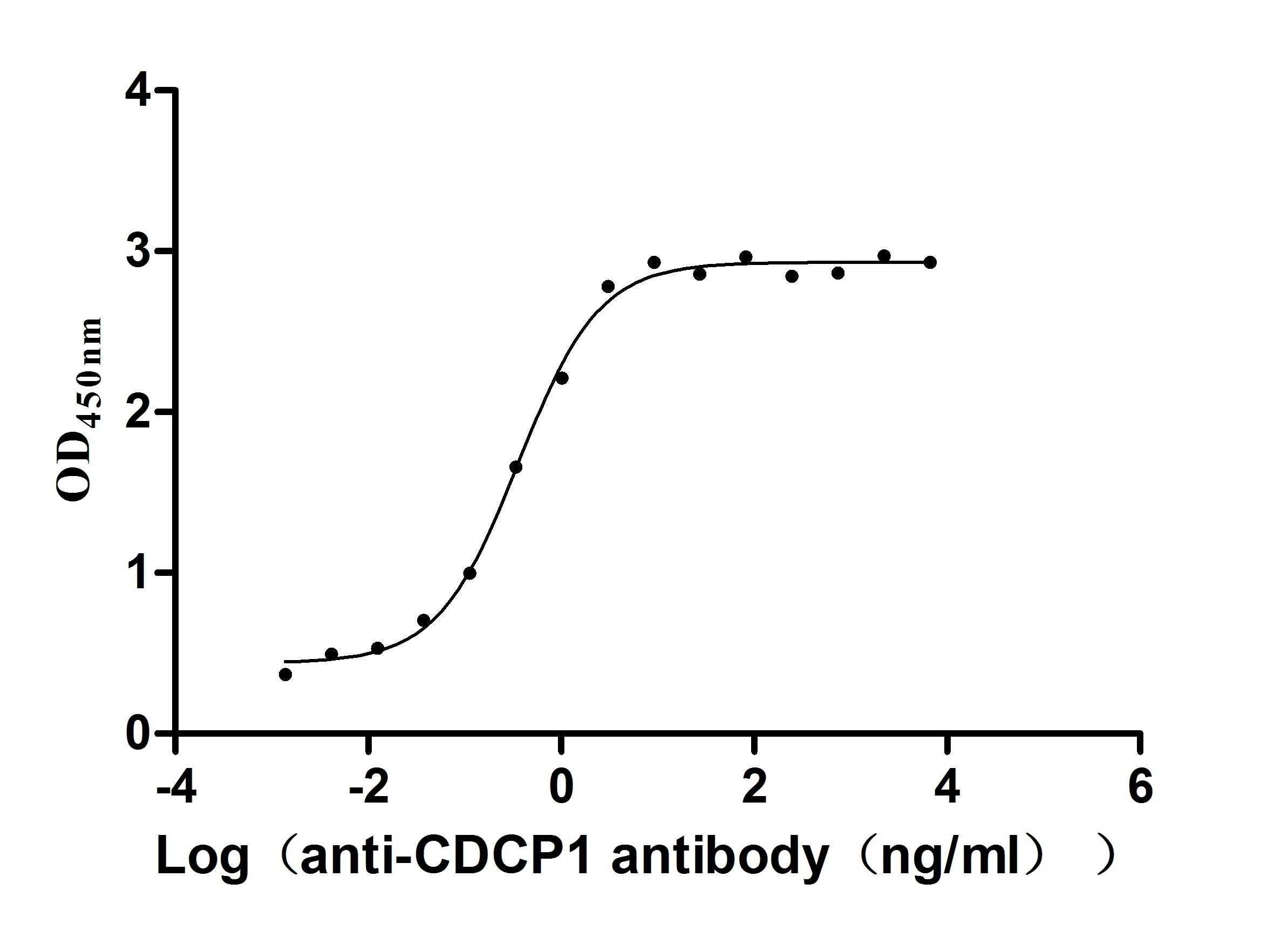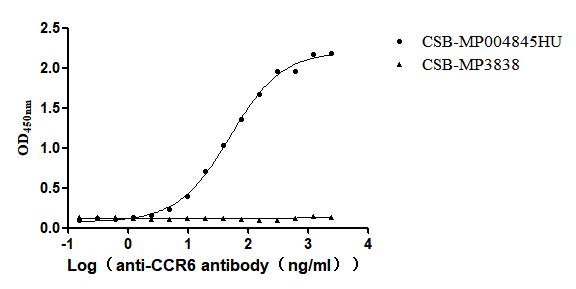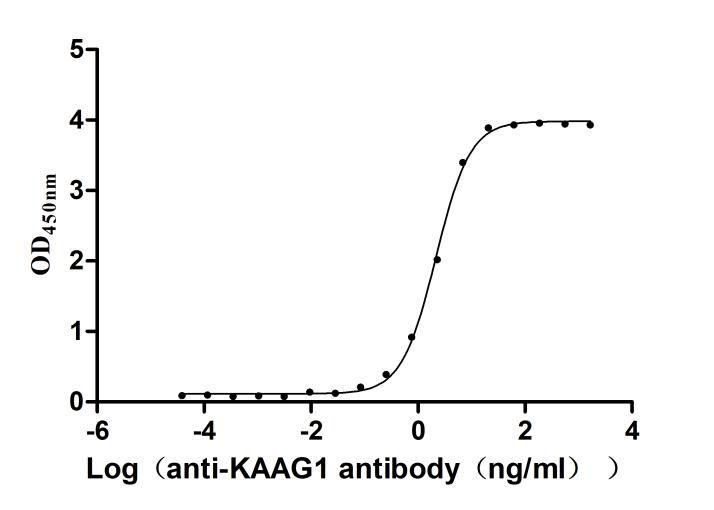Recombinant Human ELAV-like protein 4 (ELAVL4)
In Stock-
货号:CSB-EP007595HU
-
规格:¥1344
-
图片:
-
其他:
产品详情
-
纯度:Greater than 90% as determined by SDS-PAGE.
-
基因名:ELAVL4
-
Uniprot No.:
-
别名:ELAV (embryonic lethal abnormal vision Drosophila) like 4; ELAV L4; ELAV like 4; ELAV like protein 4; ELAV-like protein 4; ELAV4_HUMAN; Elavl4; Embryonic lethal abnormal vision Drosophila homolog of like 4; Hu antigen D; Hu-antigen D; HuD; Paraneoplastic encephalomyelitis antigen HuD; PNEM
-
种属:Homo sapiens (Human)
-
蛋白长度:Full Length
-
来源:E.coli
-
分子量:61.8kDa
-
表达区域:1-380aa
-
氨基酸序列MVMIISTMEPQVSNGPTSNTSNGPSSNNRNCPSPMQTGATTDDSKTNLIVNYLPQNMTQEEFRSLFGSIGEIESCKLVRDKITGQSLGYGFVNYIDPKDAEKAINTLNGLRLQTKTIKVSYARPSSASIRDANLYVSGLPKTMTQKELEQLFSQYGRIITSRILVDQVTGVSRGVGFIRFDKRIEAEEAIKGLNGQKPSGATEPITVKFANNPSQKSSQALLSQLYQSPNRRYPGPLHHQAQRFRLDNLLNMAYGVKRLMSGPVPPSACPPRFSPITIDGMTSLVGMNIPGHTGTGWCIFVYNLSPDSDESVLWQLFGPFGAVNNVKVIRDFNTNKCKGFGFVTMTNYDEAAMAIASLNGYRLGDRVLQVSFKTNKAHKS
Note: The complete sequence including tag sequence, target protein sequence and linker sequence could be provided upon request. -
蛋白标签:N-terminal 10xHis-SUMO-tagged and C-terminal Myc-tagged
-
产品提供形式:Liquid or Lyophilized powder
Note: We will preferentially ship the format that we have in stock, however, if you have any special requirement for the format, please remark your requirement when placing the order, we will prepare according to your demand. -
缓冲液:Tris-based buffer,50% glycerol
-
储存条件:Store at -20°C/-80°C upon receipt, aliquoting is necessary for mutiple use. Avoid repeated freeze-thaw cycles.
-
保质期:The shelf life is related to many factors, storage state, buffer ingredients, storage temperature and the stability of the protein itself.
Generally, the shelf life of liquid form is 6 months at -20°C/-80°C. The shelf life of lyophilized form is 12 months at -20°C/-80°C. -
货期:3-7 business days
-
注意事项:Repeated freezing and thawing is not recommended. Store working aliquots at 4°C for up to one week.
-
Datasheet & COA:Please contact us to get it.
相关产品
靶点详情
-
功能:RNA-binding protein that is involved in the post-transcriptional regulation of mRNAs. Plays a role in the regulation of mRNA stability, alternative splicing and translation. Binds to AU-rich element (ARE) sequences in the 3' untranslated region (UTR) of target mRNAs, including GAP43, VEGF, FOS, CDKN1A and ACHE mRNA. Many of the target mRNAs are coding for RNA-binding proteins, transcription factors and proteins involved in RNA processing and/or neuronal development and function. By binding to the mRNA 3'UTR, decreases mRNA deadenylation and thereby contributes to the stabilization of mRNA molecules and their protection from decay. Also binds to the polyadenylated (poly(A)) tail in the 3'UTR of mRNA, thereby increasing its affinity for mRNA binding. Mainly plays a role in neuron-specific RNA processing by stabilization of mRNAs such as GAP43, ACHE and mRNAs of other neuronal proteins, thereby contributing to the differentiation of neural progenitor cells, nervous system development, learning and memory mechanisms. Involved in the negative regulation of the proliferative activity of neuronal stem cells and in the positive regulation of neuronal differentiation of neural progenitor cells. Promotes neuronal differentiation of neural stem/progenitor cells in the adult subventricular zone of the hippocampus by binding to and stabilizing SATB1 mRNA. Binds and stabilizes MSI1 mRNA in neural stem cells. Exhibits increased binding to ACHE mRNA during neuronal differentiation, thereby stabilizing ACHE mRNA and enhancing its expression. Protects CDKN1A mRNA from decay by binding to its 3'-UTR. May bind to APP and BACE1 mRNAS and the BACE1AS lncRNA and enhance their stabilization. Plays a role in neurite outgrowth and in the establishment and maturation of dendritic arbors, thereby contributing to neocortical and hippocampal circuitry function. Stabilizes GAP43 mRNA and protects it from decay during postembryonic development in the brain. By promoting the stabilization of GAP43 mRNA, plays a role in NGF-mediated neurite outgrowth. Binds to BDNF long 3'UTR mRNA, thereby leading to its stabilization and increased dendritic translation after activation of PKC. By increasing translation of BDNF after nerve injury, may contribute to nerve regeneration. Acts as a stabilizing factor by binding to the 3'UTR of NOVA1 mRNA, thereby increasing its translation and enhancing its functional activity in neuron-specific splicing. Stimulates translation of mRNA in a poly(A)- and cap-dependent manner, possibly by associating with the EIF4F cap-binding complex. May also negatively regulate translation by binding to the 5'UTR of Ins2 mRNA, thereby repressing its translation. Upon glucose stimulation, Ins2 mRNA is released from ELAVL4 and translational inhibition is abolished. Also plays a role in the regulation of alternative splicing. May regulate alternative splicing of CALCA pre-mRNA into Calcitonin and Calcitonin gene-related peptide 1 (CGRP) by competing with splicing regulator TIAR for binding to U-rich intronic sequences of CALCA pre-mRNA.
-
基因功能参考文献:
- N-myc levels appear to be modulated by the antagonistic interactions of both miR-17, as a negative regulator, and HuD, as a positive regulator in N-myc-amplified neuroblastoma cells. PMID: 28560387
- The high titres of HuD in SCLC patients and preferable consistency suggested that HuD may serve as a potential diagnostic criterium for SCLC and may serve as a marker of disease progression. PMID: 28739747
- HuD binds to the APP and BACE1 3' UTRs and increases APP and BACE1 levels. PMID: 24857657
- study showed HuD is associated with histological grade, iffuse invasion and nodal metastasis in oral squamous cell carcinoma; it regulates expression of VEGF-A, VEGF-D, MMP-2 and MMP-9 PMID: 25278027
- Phosphomimetic mutation at position Ser 221 increased nuclear HUD export. PMID: 23978401
- Alzheimer's disease brain tissues with elevated neuroserpin protein also showed increased expression of THRbeta1 and HuD PMID: 24036060
- It can be involved in the pathogenesis of meningiomas in male patients. PMID: 22965691
- found that p97 and its cofactor, UBXD8, destabilize p21, MKP-1, and SIRT1, three established mRNA targets of the RNA-binding protein HuR, by promoting release of HuR from mRNA PMID: 23618873
- HuD is a pivotal regulator of insulin translation in pancreatic beta cells. PMID: 22387028
- the endogenous function of ELAVL4 in relation to radiation sensitivity might be the regulation of cell proliferation and death PMID: 21491091
- Complexes of HuD and Tax epitopes with HLA-A2 are close but imperfect structural mimics: alphabeta T-cell receptor with self antigens is driven to engage HuD in the same traditional binding mode as Tax. PMID: 21282516
- alterations of nELAV genes could be involved in the onset and/or progression of a subset of neuroendocrine lung tumors. PMID: 19410329
- HuD stabilizes the GAP-43 mRNA through a mechanism that is dependent on the length of the poly(A) tail and involves changes in its affinity for the mRNA PMID: 12034726
- HuD expression in neuroblastoma PMID: 12209604
- the importance of post-transcriptional mechanisms in regulating AChE expression in differentiating neurons and implicate HuD as a key trans-acting factor in these events PMID: 12468554
- Ten HuD-derived peptides immunogenic in HLA-A*0201 restriction demonstrate in vitro binding to the HLA molecule, 8 elicit specific cytotoxic T lymphocytes (CTLs) in a murine model, 2 elicit specific human CTLs, and 1 is naturally processed and presented. PMID: 14512168
- Significant T-cell activation occurred in response to 74% of the selected HuD peptides in Hu-positive patients, suggesting a role of cellular immunity during the course of anti-Hu syndrome. PMID: 15735910
- potential role for ELAVL4 suggested as a modifier gene for age at onset of Parkinson's disease PMID: 15827745
- propose that haploinsufficiency of HuD due to chromosome #1p deletion in neuroblastoma selects for cells that amplify N-myc genes PMID: 16278682
- Increased expression of HuD in the transgenic hippocampus is associated with a concomitant increase in acetylcholinesterase transcript levels. PMID: 17234598
- HuD plays a role in the post-transcriptional control of GAP-43 mRNA PMID: 17577668
- Gene silencing and overexpression of the nELAV member HuD in motoneuronal NSC34 cells indicate that Nova1 mRNA stability and translation are positively and strongly controlled by the nELAV proteins PMID: 18218628
- an unregulated expression of HuD disrupts mossy fiber physiology in adult mice in part by altering the expression and phosphorylation of GAP-43 and the amount of free calmodulin available at the synaptic terminal PMID: 18493953
- Association with rs967582 in a third cohort further implicates ELAVL4 as a Parkinson disease susceptibility gene. PMID: 18587682
- We found no evidence for the presence of HuD-specific T cells in the cerebrospinal fluid of patients with Hu-associated paraneoplastic neurological syndromes. PMID: 19252764
显示更多
收起更多
-
亚细胞定位:Cytoplasm. Perikaryon. Cell projection, dendrite. Cell projection, axon. Cell projection, growth cone.
-
蛋白家族:RRM elav family
-
组织特异性:Expressed in pancreatic beta cells (at protein level). Expressed in the brain.
-
数据库链接:
HGNC: 3315
OMIM: 168360
KEGG: hsa:1996
STRING: 9606.ENSP00000349594
UniGene: Hs.213050
Most popular with customers
-
Recombinant Human Tumor necrosis factor receptor superfamily member 8 (TNFRSF8), partial (Active)
Express system: Mammalian cell
Species: Homo sapiens (Human)
-
Recombinant Human CUB domain-containing protein 1 (CDCP1), partial (Active)
Express system: Mammalian cell
Species: Homo sapiens (Human)
-
Recombinant Human C-C chemokine receptor type 6(CCR6)-VLPs (Active)
Express system: Mammalian cell
Species: Homo sapiens (Human)
-
Recombinant Human Kidney-associated antigen 1(KAAG1) (Active)
Express system: E.coli
Species: Homo sapiens (Human)

